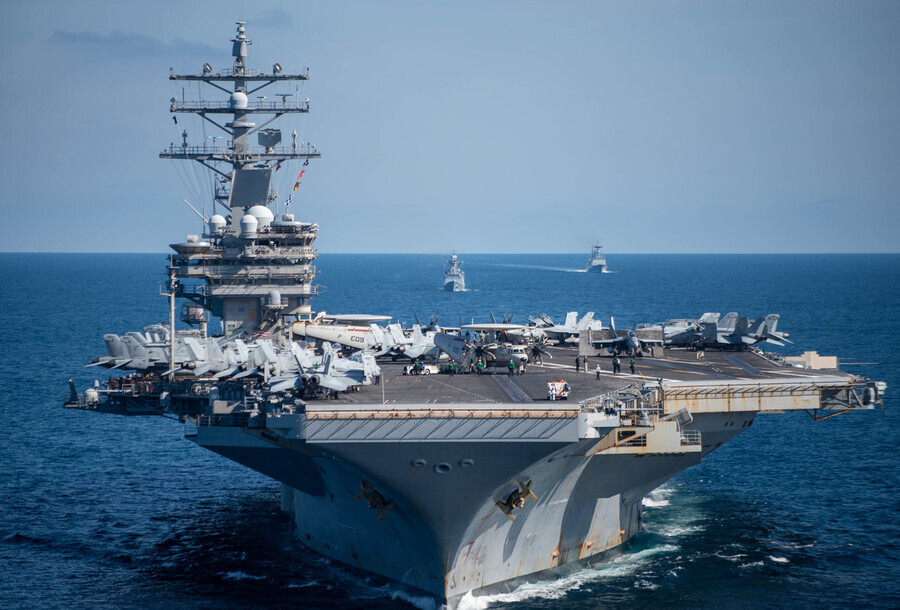hankyoreh
Links to other country sites 다른 나라 사이트 링크
Seoul pushes to restore SK-US-JP military cooperation to pre-2017 level, despite little progress on historical issues

On Thursday, the South Korean Navy announced that it would be conducting anti-submarine warfare exercises with the US and Japan in the international waters off the peninsula’s eastern coast Friday.
“These exercises are designed to strengthen our ability to respond to the increasing threat of North Korean submarines, such as by upgrading submarine-launched ballistic missile (SLBM) capabilities, amidst North Korea’s consecutive ballistic launches and the continued North Korean nuclear and missile threat,” the Navy explained in a statement on Thursday.
The exercises will include the Korean Navy’s destroyer ROKS Munmu the Great, the US Navy's nuclear-powered aircraft carrier USS Ronald Reagan, the cruiser USS Chancellorsville, the Aegis-equipped USS Barry destroyer, and the Japanese Maritime Self-Defense Force’s JS Asahi destroyer.
During the drills, participating warships from each country will search, identify and track submarines and exchange relevant information with each other.
This is the first time in five years that South Korea, the US and Japan are conducting joint maritime exercises on international waters, the most recent being held on April 3, 2017.
In a Facebook post uploaded on his page on Wednesday, Democratic Party lawmaker Ahn Gyu-back pointed out that the trilateral military drills would be held in waters just 150 km from Dokdo. Ahn criticized the current administration of President Yoon Suk-yeol, asking if it would “allow the Japanese Self Defense Forces to intervene in the event of a conflict on the Korean Peninsula.”
The same day, the Ministry of National Defense issued a statement saying that the exercises are part of the ministry’s “measures to restore South Korea, US, and Japan's military cooperation to levels before 2017 to respond to North Korea's nuclear and missile [threat].”
In addition, the ministry said the exercises were being pushed forward to “improve the search, identification and tracking capabilities of North Korean submarines that are capable of launching SLBMs.”
In response to criticism of the drills taking place near Dokdo, the ministry said it had chosen the international waters of the East Sea “considering North Korea’s SLBM threat and the expected maritime area for major [North Korean] submarine activity.”
“The US is most wary of [the possibility of] North Korean submarines going beyond the East Sea, entering the Pacific Ocean, and then launching an SLBM after getting as close as possible to the US mainland and territory,” commented Lee Ki-tae, a researcher at the Korea Institute for National Unification.
“This is why they are conducting the South Korea-US-Japan exercises in the East Sea,” Lee added.
On the other hand, a former diplomatic and security official argued that “the key point of these exercises is for South Korea, the US and Japan to collectively put pressure on China,” adding that the joint drills “can be seen as the beginning of a long-cherished goal of the US.”
However, the Ministry of National Defense’s idea of wanting to “restore” South Korea-US-Japan military cooperation to pre-2017 levels is being criticized as being a unilateral concession to Japan while ignoring public sentiment at home.
“Not a single one of the pending issues between South Korea and Japan has been resolved yet, such as the comfort women issue or the use of forced labor by Japan, and it does not seem that Japan has any intention of changing its attitude,” the former diplomatic and security official shared.
“Besides, isn't Japan a country that even holds territorial ambitions for Dokdo?” the official pointed out.
“Public opinion is bound to be sensitive to holding military exercises with such a country, and that too in the East Sea, where Dokdo is located,” the official says.
By Kwon Hyuk-chul, staff reporter; Jung In-hwan, staff reporter; Shin Hyeong-cheol, staff reporter
Please direct questions or comments to [english@hani.co.kr]

Editorial・opinion
![[Column] Park Geun-hye déjà vu in Yoon Suk-yeol [Column] Park Geun-hye déjà vu in Yoon Suk-yeol](https://flexible.img.hani.co.kr/flexible/normal/500/300/imgdb/original/2024/0424/651713945113788.jpg) [Column] Park Geun-hye déjà vu in Yoon Suk-yeol
[Column] Park Geun-hye déjà vu in Yoon Suk-yeol![[Editorial] New weight of N. Korea’s nuclear threats makes dialogue all the more urgent [Editorial] New weight of N. Korea’s nuclear threats makes dialogue all the more urgent](https://flexible.img.hani.co.kr/flexible/normal/500/300/imgdb/original/2024/0424/7317139454662664.jpg) [Editorial] New weight of N. Korea’s nuclear threats makes dialogue all the more urgent
[Editorial] New weight of N. Korea’s nuclear threats makes dialogue all the more urgent- [Guest essay] The real reason Korea’s new right wants to dub Rhee a founding father
- [Column] ‘Choson’: Is it time we start referring to N. Korea in its own terms?
- [Editorial] Japan’s rewriting of history with Korea has gone too far
- [Column] The president’s questionable capacity for dialogue
- [Column] Are chaebol firms just pizza pies for families to divvy up as they please?
- [Column] Has Korea, too, crossed the Rubicon on China?
- [Correspondent’s column] In Japan’s alliance with US, echoes of its past alliances with UK
- [Editorial] Does Yoon think the Korean public is wrong?
Most viewed articles
- 1‘We must say no’: Seoul defense chief on Korean, USFK involvement in hypothetical Taiwan crisis
- 2N. Korean delegation’s trip to Iran shows how Pyongyang is leveraging ties with Moscow
- 3Amnesty notes ‘erosion’ of freedom of expression in Korea in annual human rights report
- 4[Column] Park Geun-hye déjà vu in Yoon Suk-yeol
- 5‘Weddingflation’ breaks the bank for Korean couples-to-be
- 6[Reportage] On US campuses, student risk arrest as they call for divestment from Israel
- 7[Editorial] New weight of N. Korea’s nuclear threats makes dialogue all the more urgent
- 8Why Korea shouldn’t welcome Japan’s newly beefed up defense cooperation with US
- 9[Guest essay] The real reason Korea’s new right wants to dub Rhee a founding father
- 10Will NewJeans end up collateral damage in internal feud at K-pop juggernaut Hybe?